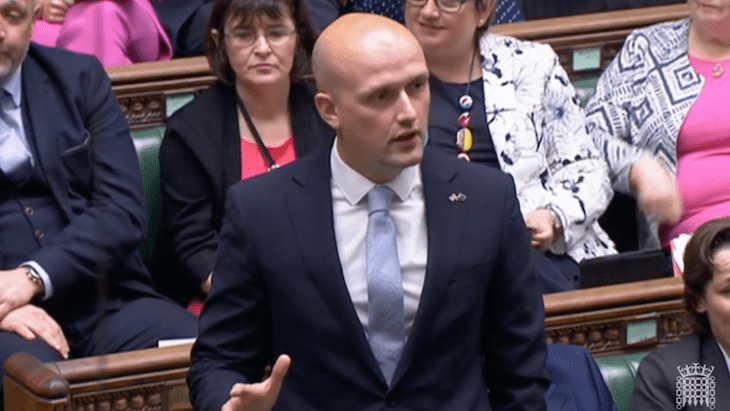Will Rishi Sunak commit to the pensions triple lock in the next Conservative manifesto? That’s going to be one of the big questions of the autumn, not least because the Prime Minister won’t answer it. He didn’t do so today when quizzed on it by the SNP’s Stephen Flynn and Labour MPs – but at least has the political cover that the Labour leadership isn’t committing to the policy as a manifesto pledge either.
Flynn’s two questions to the Prime Minister were much better than the ones from Starmer. The SNP Westminster leader is a confident speaker who can look comfortable rather than contrived when he chuckles in response to a vague answer. That came in handy today when Sunak did not answer his first question on the triple lock. Flynn asked:
‘As someone who spends more money heating their swimming pool than the total value of the UK state pension, I think it’s safe to say the Prime Minister might not be as invested in this topic as some others. But let’s afford him the opportunity to clear up any confusion. Will he commit his party, the Conservative Party, to maintaining the state pension triple lock beyond the next general election? Yes or no?’
Flynn’s questions to the PM were much better than those from Starmer
Sunak responded that ‘this is the party that introduced the triple lock! This is the party that has delivered a £3,000 increase in the state pension since 2010…There is one party in this house that is always set up for our pensioners and that is the Conservative Party.’
As Flynn observed, there was no ‘yes’ in that answer. He used his second question to claim that Labour and the Tories were the same, so it wasn’t true when Gordon Brown told Scots that the best way to protect your pension was to stay in the UK.
Starmer, unsurprisingly, hadn’t sought to cast the Tories and Labour in the same light with his questions. He struck to his usual theme of broken Britain, running through the escape from Wandsworth Prison of Daniel Khalife; conditions in prisons more generally; allegations of a Chinese spy working in the Commons and Britain’s confused stance on relations with China; and small boat crossings.
‘No-one voted for this shambles,’ he said in his final question. ‘No-one voted for him. So how much more damage do the British public have to put up with before he finally finds the stomach to give them a say?’ There wasn’t, though, much of an argument from Starmer about Labour’s alternative approach to any of this.
Sunak highlighted this when he offered his (also familiar) retort. He reminded the Chamber that Starmer had campaigned for Jeremy Corbyn to become prime minister. He also criticised Labour for deciding to vote against the government’s relaxation to planning rules around nutrient neutrality, saying:
‘He tried in this House to talk the talk on housebuilding. But at the first sign of a cheap political hit, what did he do? He’s caved in, Mr Speaker. Rather than making the right long-term decisions for the country, he’s taken the easy way out. It is typical of the principles-free, conviction-free type of leadership, he’ll be flip-flopping from being a builder to a blocker. Mr Speaker, the British public can’t trust a word he says.’
Once again, Sunak didn’t have any trouble from his backbenchers this afternoon, and they enjoyed his attacks on Starmer. He wasn’t under any pressure on any particular policy point, so will be able to forget the session quite quickly.







Comments